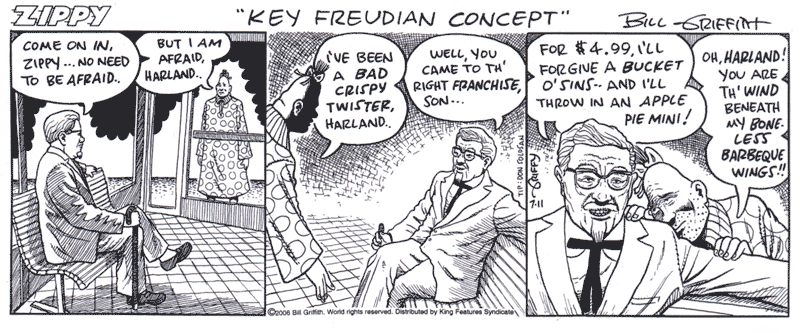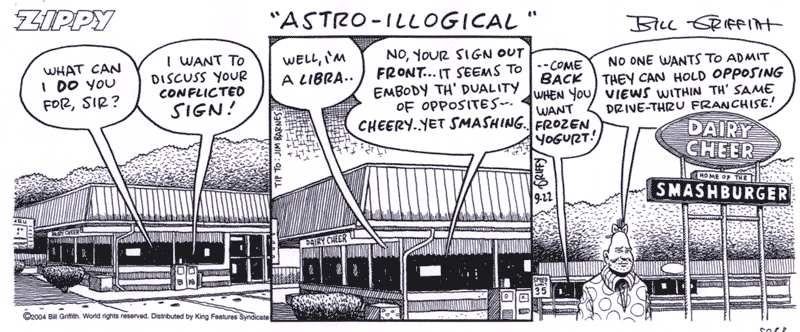PE didn't say this reality is meaningless and without hope? Are you saying that?
Take your sleepmask off.
False belief leads nowhere good.
Take your sleepmask off.
False belief leads nowhere good.
Materialistic, meaningless and without hope are only the conclusions of theists, who are theists because they can't accept this reality no matter what.
And that reality is what?
What... this reality which is material, meaningless and without hope?
Generally what you find in a lot of atheist arguments is a lot of noise about what isn't real and hardly anything about what is.LG said:
DDog said:
What did I tell you about the conclusions of theists? There seems to be a problem with theists being able to not only accept the reality we exist in but also to even admit that it is a reality. For some reason this universe, this Earth, this life is abhorrent.
If Bill Griffith ever gets writer's block, perhaps you could double as his script writerI'm starting think(just popped into my head) that theism is a mental disorder, a form of depression not yet diagnosed. Usually people who are dissatisfied and overly despondent about life are prone to suicide or mental & nervous breakdowns. Believing in some other reality complete with gods, alternative universes and things beyond normal comprehension seems to be somewhat therapeutic for those on the verge of self-destruction or at least in possession of an inferiority complex. It's like a fail-safe mechanism to preserve the life by giving it some purpose, some hope to continue. Bizarre.

There's a whole world out there just waiting to double over from your scathing analytic self!Take a look at LG & DDog. They're so confident about this alternate world that they know all about it without ever having been there. Plus they know the way. They actually feel superior and well they should. It is very tough to argue against their dreamworlds because no one can say with 100% certainty that they're not real. (A schizo's world is very real) As long as this is status quo then they assume some power in what would normally be a very bland existence. They have become rulers of their domains, world's that no one else with a level head will ever sense.

It might pay to be heedful of the impending superiority complex headed your wayThen again, if theism is a form of mental illness then a majority of the human race is very unstable. When I look around I have to think it might be true.
It might pay to be heedful of the impending superiority complex headed your way
actually my point was more about the ante you have riding on the extremely tentative ...Another typical theistic conclusion. A bit of a theist's original inferiority complex (their true state of being) is still capable of rearing its ugly head from time to time.
Right on EndLightEnd!! :cheers:EndLightEnd said:Cant have one without the other... Each lends perspective to the other.Diogenes' Dog said:Without the challenges of atheism, religion can get fanciful and superstitious, but without theism, atheism can oversimplify our experience to the minimal state of our current paradigm - materialist, meaningless and without hope. ”
I don't believe that life is abhorrent, just the opposite... but it helps to have some belief in a meaningful existence when life goes pear-shaped. Likewise, I'm not (and neither is LG I think) proposing any other 'reality', just a different way of seeing - a less reductive/Cartesian perspective than the atheist's worldview (you may find it hard to believe that there could be any other perspective).What did I tell you about the conclusions of theists? There seems to be a problem with theists being able to not only accept the reality we exist in but also to even admit that it is a reality. For some reason this universe, this Earth, this life is abhorrent.
Just to correct you, the evidence of numerous studies seems to point to theists being healthier mentally (and physically) than non-theists - happier too. Here's just three articles from non-biased journals:I'm starting think(just popped into my head) that theism is a mental disorder, a form of depression not yet diagnosed. Usually people who are dissatisfied and overly despondent about life are prone to suicide or mental & nervous breakdowns.
...Wonderful rant PE!Take a look at LG & DDog. They're so confident about this alternate world that they know all about it without ever having been there. Plus they know the way. They actually feel superior and well they should. It is very tough to argue against their dreamworlds because no one can say with 100% certainty that they're not real. (A schizo's world is very real) As long as this is status quo then they assume some power in what would normally be a very bland existence. They have become rulers of their domains, world's that no one else with a level head will ever sense.
I agree with your last sentence 100%. So, can a mechanistic material reality be a source of 'hope' and 'meaning' for you? I hope it does.... but how?StrangerInAStrangeLa said:PE didn't say this reality is meaningless and without hope? Are you saying that? Take your sleepmask off. False belief leads nowhere good.
P.E said:I'm starting think(just popped into my head) that theism is a mental disorder, a form of depression not yet diagnosed.
Usually people who are dissatisfied and overly despondent about life are prone to suicide or mental & nervous breakdowns
Believing in some other reality complete with gods, alternative universes and things beyond normal comprehension seems to be somewhat therapeutic for those on the verge of self-destruction or at least in possession of an inferiority complex.
It's like a fail-safe mechanism to preserve the life by giving it some purpose, some hope to continue. Bizarre.
It is very tough to argue against their dreamworlds because no one can say with 100% certainty that they're not real. (A schizo's world is very real)
Then again, if theism is a form of mental illness then a majority of the human race is very unstable. When I look around I have to think it might be true.
Generally what you find in a lot of atheist arguments is a lot of noise about what isn't real and hardly anything about what is.
IOW an argument that critiques a claim of reality yet doesn't have an apparent one doesn't look good.
There seems to be a problem with theists being able to not only accept the reality we exist in but also to even admit that it is a reality. For some reason this universe, this Earth, this life is abhorrent.
A characteristic resistence to define 'reality' and 'real' is not the domain only of atheists, though. I have seen in many times in theists as well. And interestingly, in theists of different denominations.
Merit becomes conspicuous by its absence in any argument that critiques a claim of reality without offering a sound definition of what is.
sureThis could be said for those who praise the same claim. In fact how could there be any merit for an unknown reality?
It's about an alternate perspective, not about an alternate world. Nor is it about feeling superior... it's about inclusion. We are all in this together! That is the point.
lightgigantic
the absence of this in fideism explains why atheists have such a straw-man fest whenever they encounter it
I agree with your last sentence 100%. So, can a mechanistic material reality be a source of 'hope' and 'meaning' for you? I hope it does.... but how?
On the contrary, all referencing a straw man involves is saying that a person is opting for a weak version of an argument simply for the sake of an easier rebuttal.That very statement is a straw-man. Too much emphasis on strawmen being the roadblock to debate, don't you think?
StangerInAStrangeLa said:Hope for what? Meaning doesn't mean anything if it's based on deception. Why do you need meaning???
Fair point Signal, each of these activities is enjoyable in it's own right. All but the last are probably the sum total of most animals lives - and satisfies them (presumably).Is life on Earth as we usually know it not materialistic, meaningless and without hope?
Working hard, eating, drinking, gratifying your senses, sleeping, having sex, fighting and philosophical speculation, each of these activites performed for their own sake, or as a way to try to prove just how wonderful we are - you call that good, happy, meaningful?
So many questions PE!PsychoticEpisode said:Where does your God reside? Do you have a soul? If so, where does the soul go when you die??Where was God before He caused everything to happen? How do you know when you're talking to God? How do you know when He answers? Where is your mind?
('Word' used in the King James is a very poor translation of logos)."In the beginning was the idea (logos), and the logos was with God, and the logos was God".
'Talking to God' is therefore listening to the very deepest part of my own mind. Seeking inspiration. Searching my own deepest values and how they apply. Handing over an insoluable problem, and then trusting it will be sorted out. It's not about talking to some other being - it's about the mysterious depths of you (and me) and the universe! :m:"If the doors of perception were cleansed, everything would appear to man as it is: Infinite." -William Blake
'Talking to God' is therefore listening to the very deepest part of my own mind. Seeking inspiration. Searching my own deepest values and how they apply. Handing over an insoluable problem, and then trusting it will be sorted out. It's not about talking to some other being - it's about the mysterious depths of you (and me) and the universe! :m:
It's the infinite, eternal Mind behind all reality. I think it's what the great spiritual leaders were trying to explain, but we somehow managed to cock it up, and produce out of it some ghastly thing called 'Religion'.StrangerInAStrangeLa said:WHY do you call it God???
DDog.... I'm not sure if your mind qualifies for godshipA mind-god is probably not what most theists have been programmed for. In fact from what you're describing I would say you are borderline atheist, which is a step up IMO.
I'm thinking that many religions practice meditation or silence and stuff. What is that about? The metaphor they often use is sinking deeper into our own minds. Where is mind? Our brains have a location in space/time, but do our minds?An idiot savant can memorize the NYC phonebook yet never solve a mind problem, let alone know they even have a mind. No two minds are alike but if you are suggesting that all minds share a common ground then I will ask you just where that is?
